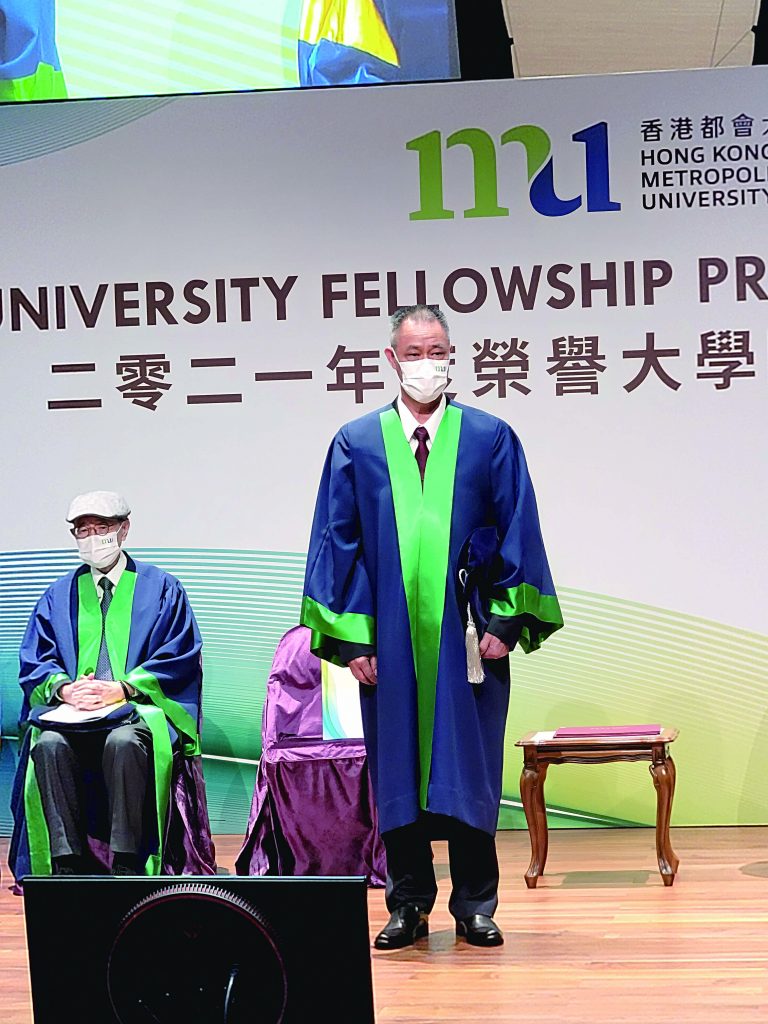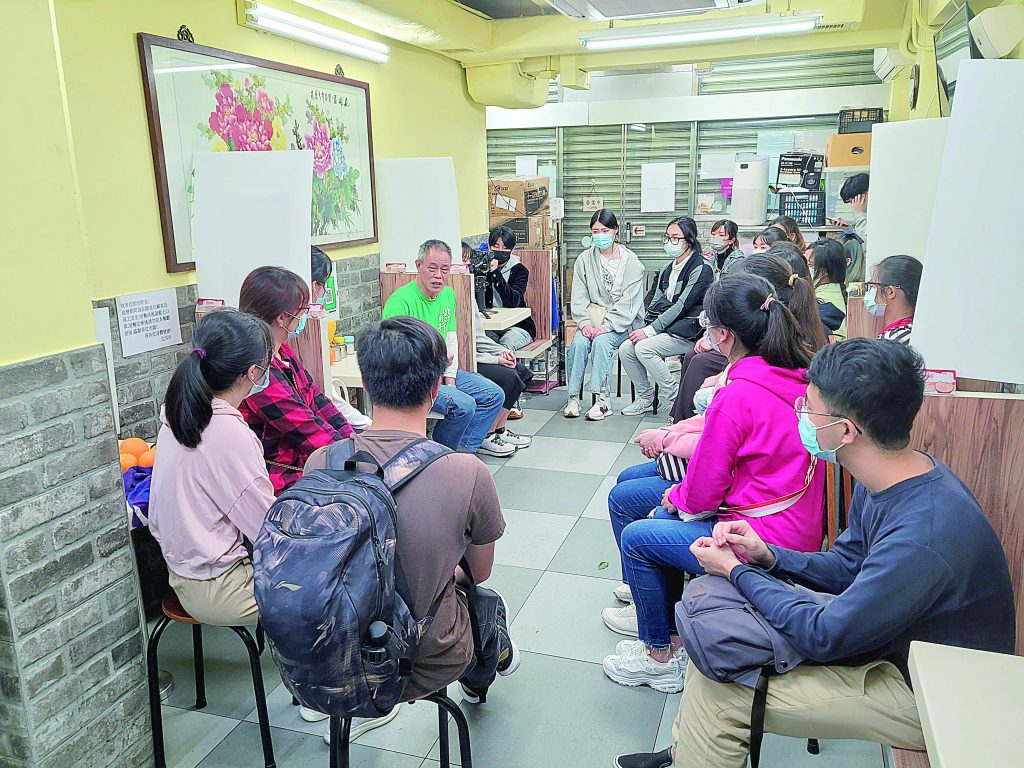Chan Cheuk-ming, aka Sham Shui Po Ming Gor, started as a chef trainee at the age of 15. Since the 1980s, he has been running a Chinese barbecue restaurant in Sham Shui Po, home to lower-class grassroots people. Though not Michelin-starred, his restaurant and Ming Gor himself are starred by not only the people in the neighbourhood but the whole of Hong Kong – for his kindness and benevolent act of giving away free meals for the needy.
Helping people is my life’s calling
Having spent half his life working in the food and beverage industry, like all ordinary citizens, Ming Gor had hoped for a comfortable life. He started as a junior in a restaurant in Mainland China, serving customers from Hong Kong and Macau, earning a humble wage of below 100 dollars a month. When he heard that he could make six times more in Hong Kong, he moved southward and became a chef at Pei Ho Barbecue Restaurant in 1983. He and his partner took over the restaurant when his boss emigrated before 1997. A bearish economy made them switch from a mid-range menu to a more affordable one, thus began the glowing reputation they enjoy today. Though the restaurant is hardly a money tree, Ming Gor has never hesitated to lend a helping hand to others. “I grew up in poverty but was lucky enough to have received help from others. I wanted to pay it forward,” says Ming Gor. In the spirit of doing the best he can, he has been giving away free meals on a regular basis. When people questioned his decision to offer free meals to an elderly lady who owns a flat to rent, he made a point of his rationale: “Those who have served the community diligently for a long time, no matter well-off or poor, deserve to enjoy social benefits. Among the people lining up for free meals are men in business suits, who have been laid off recently. I would give them meal vouchers and invite them to come back every day. My mantra is to fill the bellies of people from all walks of life.”
Years ago, Ming Gor signed a five-year contract with a social welfare organization to offer discounted “three-dish-rice” to the needy. When business was slow in the final year, the restaurant was on the verge of going out of business, and he and his partner were struggling with only HK$5,000 a month for themselves. “At that time, the government offered a HK$6,000 subsidy to each citizen, and 20 young people donated their share to us. They understood that the money – though insignificant to the wealthy – can alleviate countless problems of the poor.” They also volunteered to help Ming Gor distribute 80 free meals to those in need once a month. Their good deeds caught the eye of the public. In six months’ time, their team of volunteers grew from 20 to 200, and free meals offered have gradually ballooned to 2,000 per week. “When I set my eyes on making money, I was not successful in achieving my goal. Then I came to realize that my life’s calling is helping people. Only by helping people could I reach my full potential, do what I am meant to do, and become who I am meant to be.”
Pei Ho Barbecue Restaurant, which was later renamed Pei Ho Counterparts, became the starting point for many volunteers who came from all walks of life regardless of age, nationality, race and political stance. Ming Gor also
co-founded the Pei Ho (Ming Gor) Charity Foundation to upsize his charitable reach. Like the proverb, “give a man a fish and he will eat for a day; teach a man how to fish and you feed him for a lifetime”, Ming Gor is also a consultant for districts in need. He is the glue to volunteer networks by teaching others how to manage a social enterprise and lining up sponsors for them. Pei Ho Counterparts now offers community support services in eight districts, such as retail collaborations in Tuen Mun, To Kwa Wan and Yau Ma Tei, as well as free meal sites at housing estates in Tseung Kwan O and Kwun Tong. “The more you accomplish, the more support you will garner,” Ming Gor says with a satisfied grin.

Three things one must sacrifice for charity
To garner support and trust, and keep the purity of the charitable cause, Ming Gor says one must give up his/her wealth, power and personal grudges. “No one would trust a person who self-benefits in the name of charity. Conflicts will obviously arise if politics are involved. There are always two sides to every coin: doing good deeds does not mean that you will be loved by the beneficiaries. Constant self-reflection is important. I do not wish to make any enemies in the community: I want everyone to be friends, which is why I must let go of personal grudges.” Ming Gor’s food distribution service did receive backlash. “We were criticized for blocking the streets and spoiling the homeless who line up for free meals on Saturdays. I blame not the man who speaks but heed what I hear. Ergo, I must find out why we were criticized and our dissenters’ concern so we could improve our operations.” Not all homeless people are grateful for the free meals. A disabled homeless man once lashed out at Ming Gor for always including unsold fish heads in their meals. He answered calmly, “We give out 400 meals a day. If we had 400 fish heads left every day, my restaurant must not be doing well.” The person chased after him trying to punch him, but was thankfully comforted by a young neighbour. When Ming Gor met the homeless attacker again, he greeted him by his name and offered him a cigarette. “I must learn to respect and forgive him, and take the initiative to break the ice.” He treats community members and neighbouring businesses with respect, thus earning good reputation for himself and his operation.
The remedial mission
Pei Ho Counterparts provides four pillars of services: poverty relief, social education, balancing profits among small businesses in the community and the “remedial mission”. Ming Gor and his team aim to fill gaps in the community. These include inadequacies in current policies plus urgent issues requiring immediate attention. He illustrates, “Our first collaboration was with the Social Welfare Department. Families in need must wait at least a month to be approved for Comprehensive Social Security Assistance (CSSA). They have got to eat before then, right? Social Welfare Department would refer these cases to us, and we would provide them with two daily meals until they are approved for CSSA.” Since then, more social welfare organizations have referred to Ming Gor cases of discharged prisoners, residents of sub-divided flats, isolated elders and new immigrants. Ming Gor welcomes everyone in need and tries to help them to the best of his ability. When an elderly could not take showers for a month during winter due to a broken water heater, Ming Gor immediately sent volunteers to repair it for him. When he heard that more people had been eating leftover food scraps in restaurants, he instantly sent volunteers to investigate the situation alongside offers of meal vouchers at his restaurant. When social welfare organizations close for holidays, his team would stand by for anyone who needs help. For years, Ming Gor and his team of volunteers have distributed free meals on a regular basis. Even when his restaurant was forced to close down for a month to undergo compulsory COVID-19 testing, the meal distribution service never stopped. Only by talking to community members, understanding their needs and doing constant self-reflection could Ming Gor reveal these gaps in society. When asked if the remedial mission is stressful, he chuckles, “There is no stress in a cause of passion. After all, I am not giving away a hundred million meals by myself. Instead of shouldering all the responsibilities, we are doing what we do to inspire more to come forward and render support by doing what they are good at.”
Cultivating compassion in the youth
Ming Gor almost never declines invitations to speak publicly or appear at social awards as he hopes to inspire more young people via social education. He especially enjoys visiting schools: he believes that apart from pursuing academia, children should learn more about their society to foster compassion and contribute to the greater good in the future. “Many young people are keen to help our cause. Some parents even visited us with their kids to donate their red packets. One of those children even wrote me a letter asking me to spend his red packet money on helping those in need. You can find the displayed letter in our restaurant. I believe children should ponder this question at a young age: why are there so many homeless people and isolated elders in our society? Within every prosperous city are people who need our help. We must cultivate compassion in children so they can contribute to society whilst providing for themselves.”

Love is the best medicine
Many have asked Ming Gor when he plans to retire. In fact, he has already chosen his successors for the charitable foundation. “They will take over when I can no longer continue. Perhaps I will enjoy dim sum with them every so often in my crutches.” Compassion, devotion and objectivity are the essential qualities Ming Gor demands for his successors. He has observed each candidate closely to make sure he/she is nice to the elderly and is committed to spend long hours in long-term volunteering work. Some of his successors volunteer up to 300 days a year. As well, Ming Gor requires his management team to minimize the cost of running the foundation, and make sure that the funds go to supporting those in need. Speaking of retirement, Ming Gor is optimistic about his golden years. “We all die someday; it does not matter when we die but whether we have lived a happy and healthy life.” He once read in the newspaper about a wealthy Japanese who was suffering from cancer. His condition failed to improve albeit spending fortunes to be treated in the UK. When the patient read that love is the best medicine, he started doing volunteering work. Somehow, his cancer left him. “Our bodies self-regulate and work best when we are happy and free of grief. No medicine would work if we lived an unhappy life.”
Ming Gor led a seminar, titled “The Power of Individuals”, on Free Classroom Online, where he shared the interesting experiences he had had while distributing free meals. The seminar was hosted by two Salesians of Don Bosco Ng Siu Mui Secondary School students who asked Ming Gor questions submitted by parents and children. The intriguing questions from children were rarely asked of Ming Gor in previous interviews – such as what superpower he would like to have, to which Ming Gor responded with the ability to conjure ingredients and seasoning to ensure delicious meals for his community members. When asked about his favourite song, Ming Gor introduced Danny Chan’s “Encore” as its message aligned with the meaning behind his meal distribution services. He alluded to one lyric that sings, “Turn sighs of woes into songs of life.” Please scan the QR code to visit the YouTube channel of Free Classroom Online to watch Ming Gor’s seminar.


